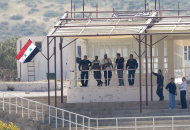
NEW YORK: They exist for only seconds at most in real life, but they’ve gained immortality in chemistry: Two new elements have been added to the periodic table.
The elements were recognized by an international committee of chemists and physicists. They’re called elements 114 and 116 for now _ permanent names and symbols will be chosen later.
You’re not likely to run into any of this stuff. Scientists make them in labs by smashing atoms of other elements together to create the new ones.
‘‘Our experiments last for many weeks, and typically, we make an atom every week or so,’’ said chemist Ken Moody of the Lawrence Livermore National Laboratory, who’s part of the discovery team.
In contrast to more familiar elements like carbon, gold and tin, the new ones are short-lived. Atoms of 114 disintegrate within a few seconds, while 116 disappears in just a fraction of a second, Moody said.
Both elements were discovered by a collaboration of scientists from Livermore and Russia. They made them by smashing calcium ions into atoms of plutonium or another element, curium. The official recognition, announced last week, cites experiments done in 2004 and 2006.
In the periodic table, the number of an element refers to the number of protons in the nucleus of an individual atom. Leading the list is hydrogen (H) with one. Sodium (Na) has 11, Iron (Fe) has 26, and silver (Ag) has 47.


































 The government could face a "substantial funding gap" for higher education after ministers underestimated the number of universities which will charge top fees, a report published on Tuesday said.
The government could face a "substantial funding gap" for higher education after ministers underestimated the number of universities which will charge top fees, a report published on Tuesday said.
 Did you answer 3 and 10? Of course you did. It’s the Pavlovian response. After all, anyone who’s ever picked up a dumbbell knows that doing 3 sets of 10 reps of each
Did you answer 3 and 10? Of course you did. It’s the Pavlovian response. After all, anyone who’s ever picked up a dumbbell knows that doing 3 sets of 10 reps of each 


 BEIRUT (AP) — Mutinous Syrian soldiers joined forces with protesters after days of crackdowns in a tense northern region, apparently killing dozens of officers and security guards, residents and activists said Tuesday.
BEIRUT (AP) — Mutinous Syrian soldiers joined forces with protesters after days of crackdowns in a tense northern region, apparently killing dozens of officers and security guards, residents and activists said Tuesday.  RAWANG, Malaysia (AP) — As a new bride, 22-year-old Ummu Atirah believes she knows the secret to a blissful marriage: obey her husband and ensure he is sexually satisfied.
RAWANG, Malaysia (AP) — As a new bride, 22-year-old Ummu Atirah believes she knows the secret to a blissful marriage: obey her husband and ensure he is sexually satisfied.